University Report: Applying Ethical Theory to Data Harvesting Online
VerifiedAdded on 2022/11/16
|7
|1482
|307
Report
AI Summary
This report delves into the ethical concerns surrounding online data harvesting, specifically focusing on the collection of personal information from social media platforms like Facebook. The analysis examines a scenario where user data was obtained through a deceptive application, highlighting the lack of informed consent and the potential for misuse of this data, particularly by political entities. The report applies classical ethical theories, including utilitarianism, deontology, virtue ethics, and the social contract theory, to evaluate the morality of this practice. The application of these theories reveals that data harvesting, as described in the case study, is unethical because it violates user privacy, disregards the principles of informed consent, and potentially causes harm to society. The report concludes by emphasizing the need for ethical considerations in software development and data handling to protect user rights and promote responsible technology use.
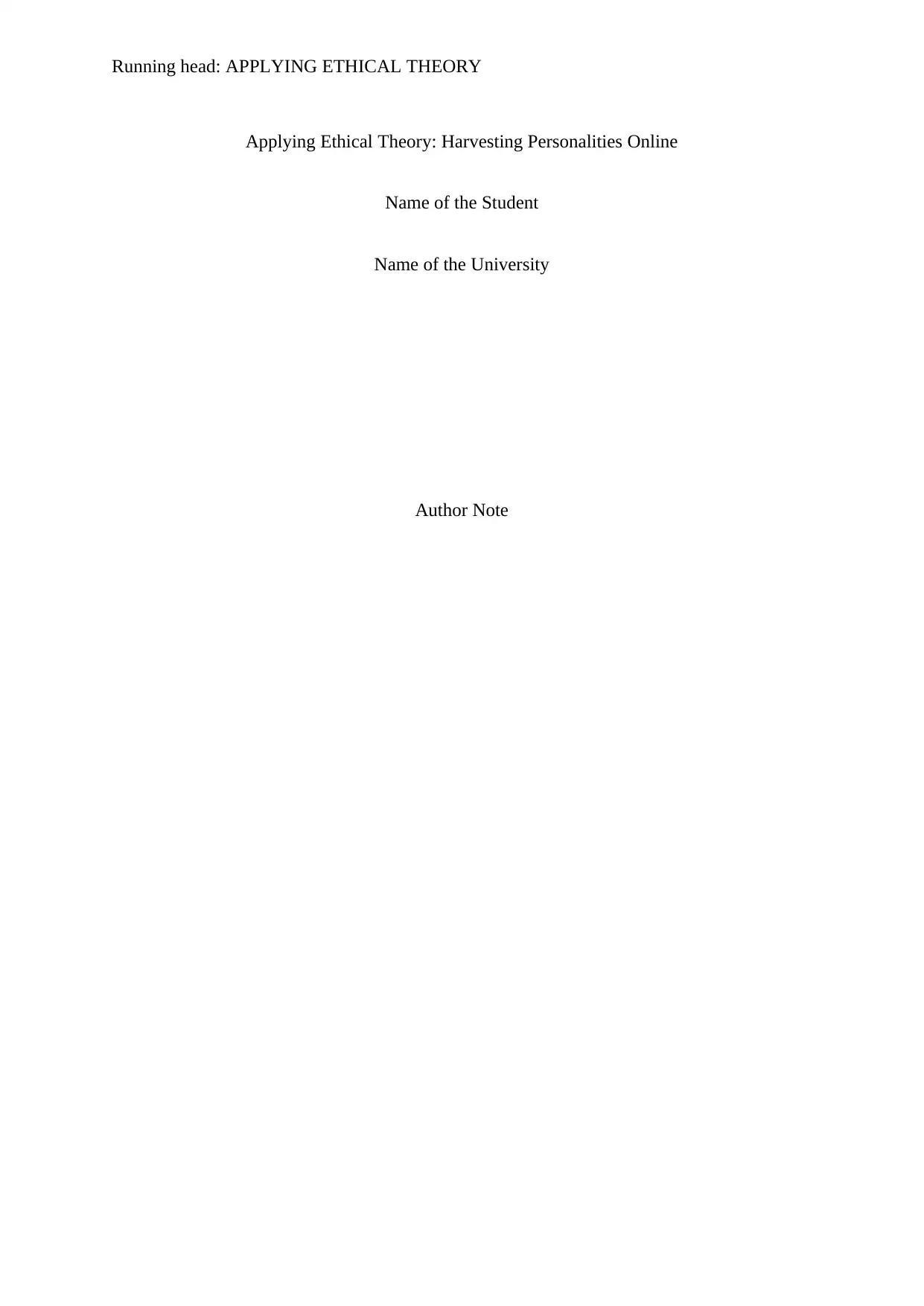
Running head: APPLYING ETHICAL THEORY
Applying Ethical Theory: Harvesting Personalities Online
Name of the Student
Name of the University
Author Note
Applying Ethical Theory: Harvesting Personalities Online
Name of the Student
Name of the University
Author Note
Paraphrase This Document
Need a fresh take? Get an instant paraphrase of this document with our AI Paraphraser
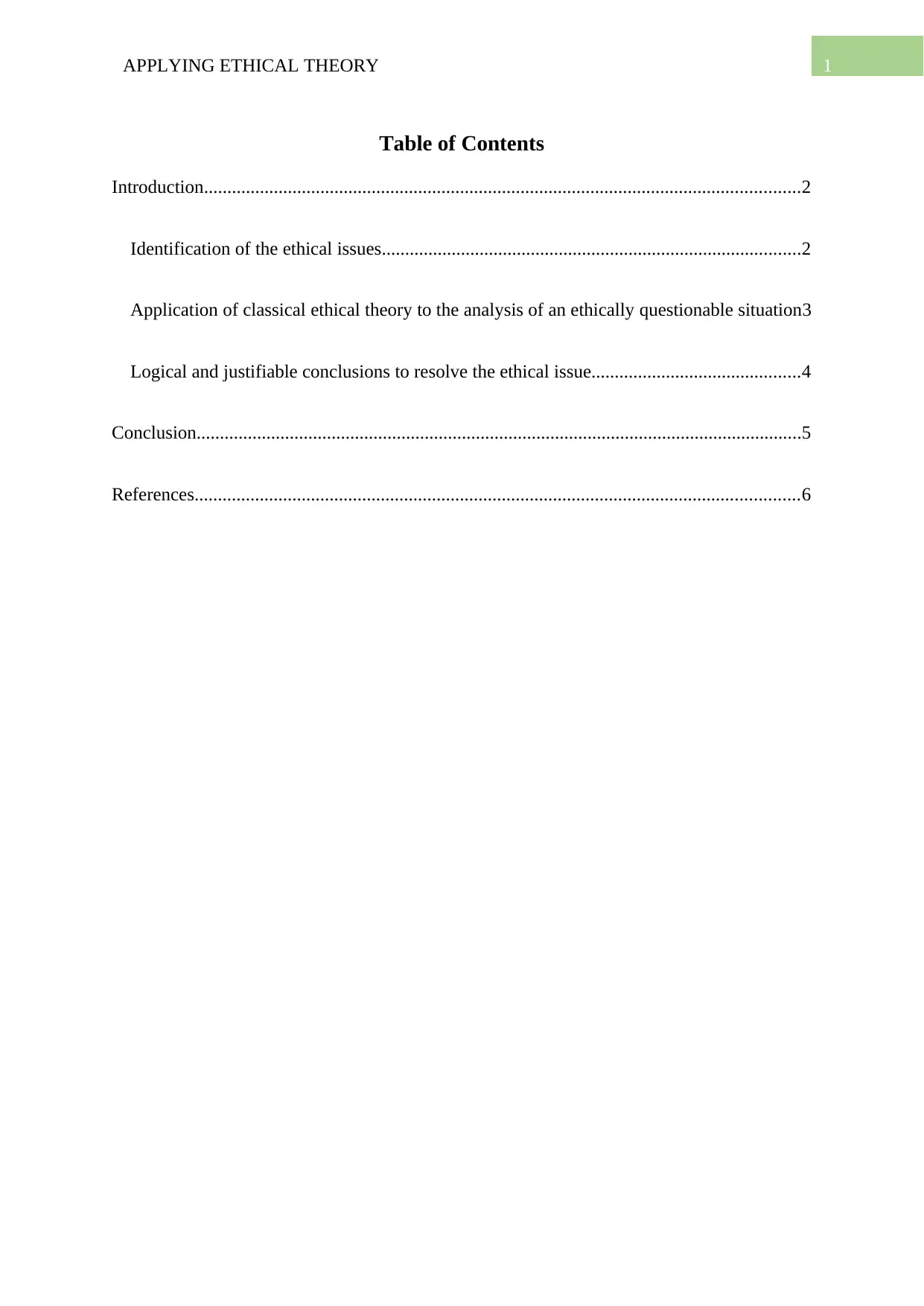
1APPLYING ETHICAL THEORY
Table of Contents
Introduction................................................................................................................................2
Identification of the ethical issues..........................................................................................2
Application of classical ethical theory to the analysis of an ethically questionable situation3
Logical and justifiable conclusions to resolve the ethical issue.............................................4
Conclusion..................................................................................................................................5
References..................................................................................................................................6
Table of Contents
Introduction................................................................................................................................2
Identification of the ethical issues..........................................................................................2
Application of classical ethical theory to the analysis of an ethically questionable situation3
Logical and justifiable conclusions to resolve the ethical issue.............................................4
Conclusion..................................................................................................................................5
References..................................................................................................................................6
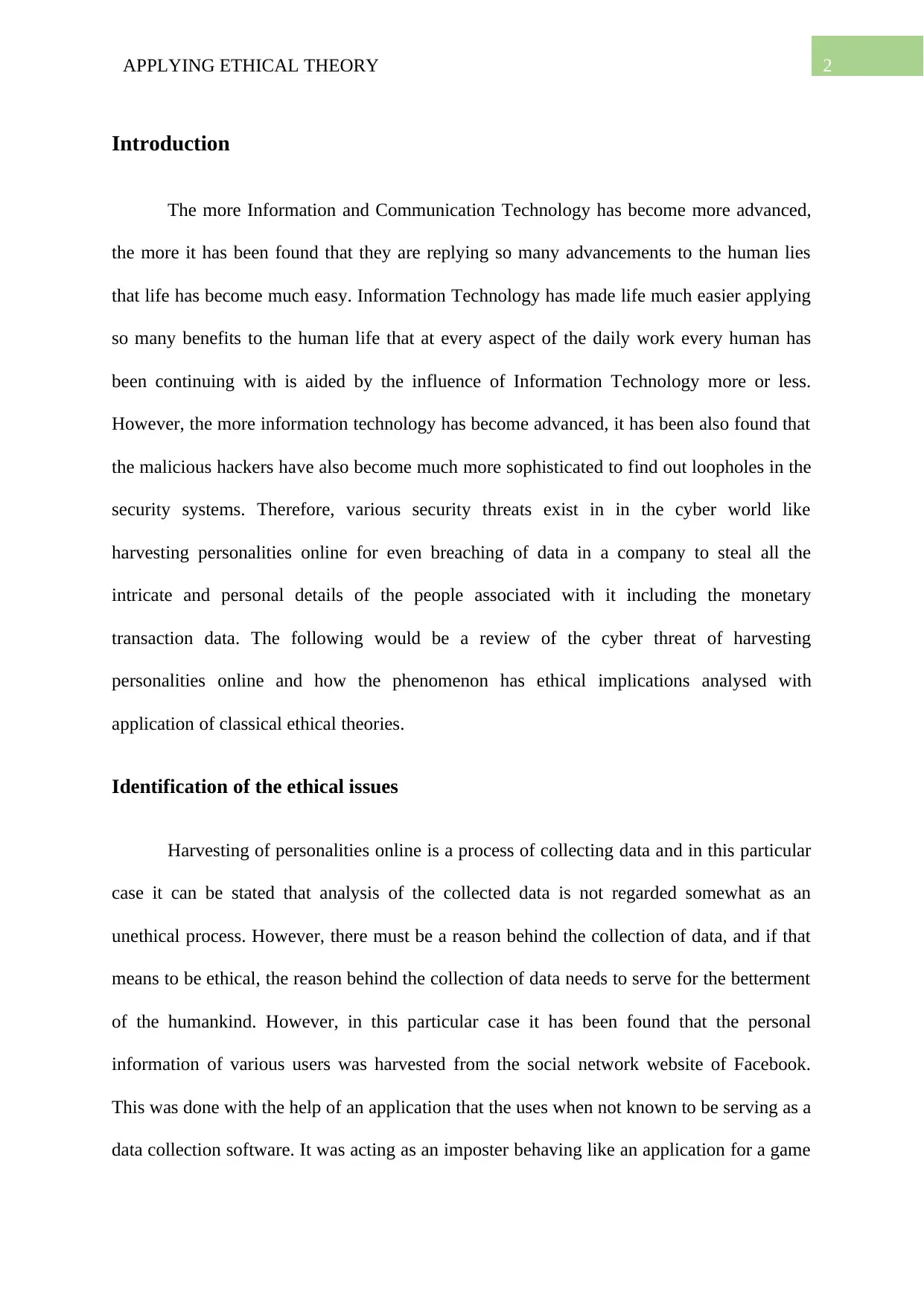
2APPLYING ETHICAL THEORY
Introduction
The more Information and Communication Technology has become more advanced,
the more it has been found that they are replying so many advancements to the human lies
that life has become much easy. Information Technology has made life much easier applying
so many benefits to the human life that at every aspect of the daily work every human has
been continuing with is aided by the influence of Information Technology more or less.
However, the more information technology has become advanced, it has been also found that
the malicious hackers have also become much more sophisticated to find out loopholes in the
security systems. Therefore, various security threats exist in in the cyber world like
harvesting personalities online for even breaching of data in a company to steal all the
intricate and personal details of the people associated with it including the monetary
transaction data. The following would be a review of the cyber threat of harvesting
personalities online and how the phenomenon has ethical implications analysed with
application of classical ethical theories.
Identification of the ethical issues
Harvesting of personalities online is a process of collecting data and in this particular
case it can be stated that analysis of the collected data is not regarded somewhat as an
unethical process. However, there must be a reason behind the collection of data, and if that
means to be ethical, the reason behind the collection of data needs to serve for the betterment
of the humankind. However, in this particular case it has been found that the personal
information of various users was harvested from the social network website of Facebook.
This was done with the help of an application that the uses when not known to be serving as a
data collection software. It was acting as an imposter behaving like an application for a game
Introduction
The more Information and Communication Technology has become more advanced,
the more it has been found that they are replying so many advancements to the human lies
that life has become much easy. Information Technology has made life much easier applying
so many benefits to the human life that at every aspect of the daily work every human has
been continuing with is aided by the influence of Information Technology more or less.
However, the more information technology has become advanced, it has been also found that
the malicious hackers have also become much more sophisticated to find out loopholes in the
security systems. Therefore, various security threats exist in in the cyber world like
harvesting personalities online for even breaching of data in a company to steal all the
intricate and personal details of the people associated with it including the monetary
transaction data. The following would be a review of the cyber threat of harvesting
personalities online and how the phenomenon has ethical implications analysed with
application of classical ethical theories.
Identification of the ethical issues
Harvesting of personalities online is a process of collecting data and in this particular
case it can be stated that analysis of the collected data is not regarded somewhat as an
unethical process. However, there must be a reason behind the collection of data, and if that
means to be ethical, the reason behind the collection of data needs to serve for the betterment
of the humankind. However, in this particular case it has been found that the personal
information of various users was harvested from the social network website of Facebook.
This was done with the help of an application that the uses when not known to be serving as a
data collection software. It was acting as an imposter behaving like an application for a game
⊘ This is a preview!⊘
Do you want full access?
Subscribe today to unlock all pages.

Trusted by 1+ million students worldwide
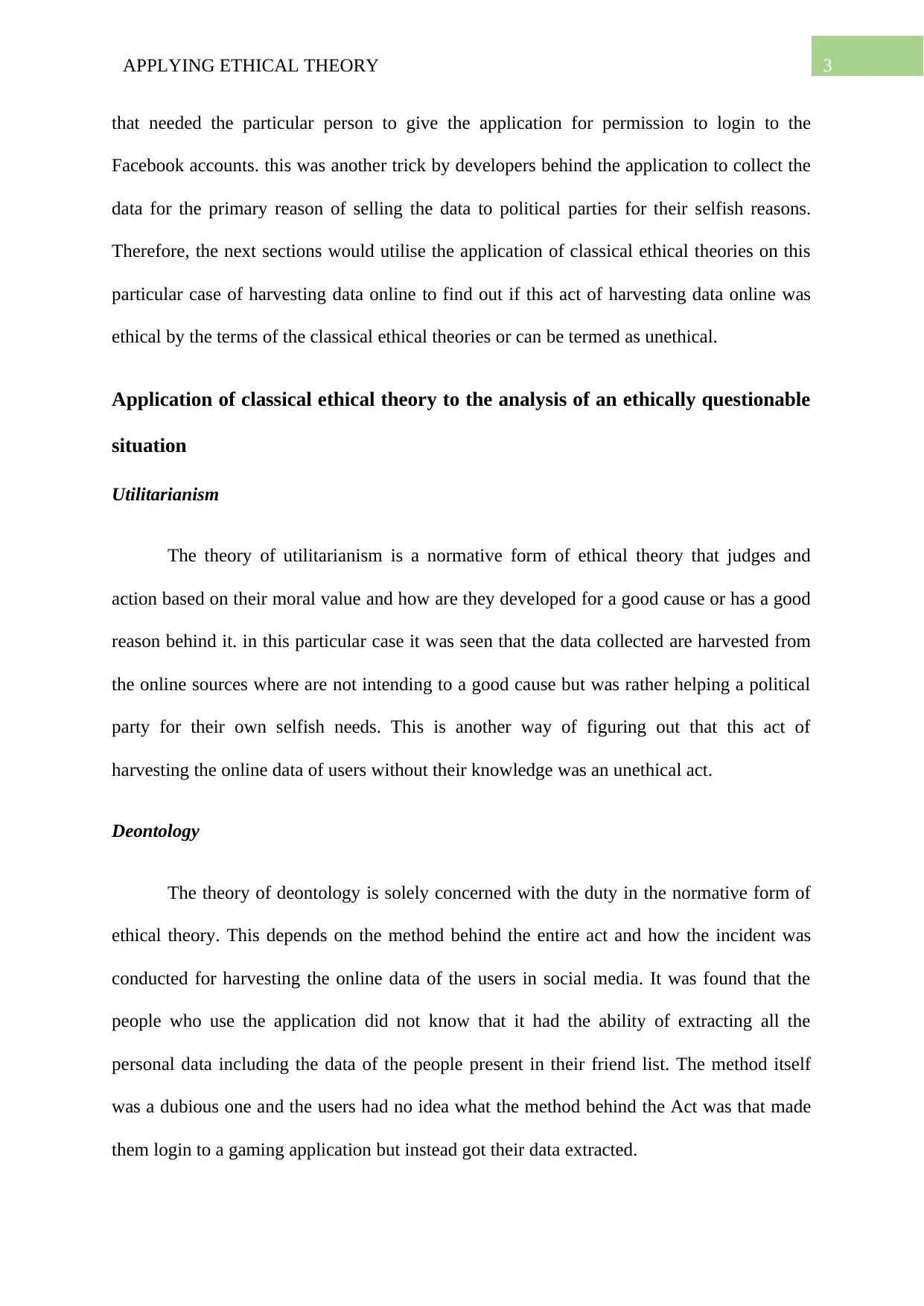
3APPLYING ETHICAL THEORY
that needed the particular person to give the application for permission to login to the
Facebook accounts. this was another trick by developers behind the application to collect the
data for the primary reason of selling the data to political parties for their selfish reasons.
Therefore, the next sections would utilise the application of classical ethical theories on this
particular case of harvesting data online to find out if this act of harvesting data online was
ethical by the terms of the classical ethical theories or can be termed as unethical.
Application of classical ethical theory to the analysis of an ethically questionable
situation
Utilitarianism
The theory of utilitarianism is a normative form of ethical theory that judges and
action based on their moral value and how are they developed for a good cause or has a good
reason behind it. in this particular case it was seen that the data collected are harvested from
the online sources where are not intending to a good cause but was rather helping a political
party for their own selfish needs. This is another way of figuring out that this act of
harvesting the online data of users without their knowledge was an unethical act.
Deontology
The theory of deontology is solely concerned with the duty in the normative form of
ethical theory. This depends on the method behind the entire act and how the incident was
conducted for harvesting the online data of the users in social media. It was found that the
people who use the application did not know that it had the ability of extracting all the
personal data including the data of the people present in their friend list. The method itself
was a dubious one and the users had no idea what the method behind the Act was that made
them login to a gaming application but instead got their data extracted.
that needed the particular person to give the application for permission to login to the
Facebook accounts. this was another trick by developers behind the application to collect the
data for the primary reason of selling the data to political parties for their selfish reasons.
Therefore, the next sections would utilise the application of classical ethical theories on this
particular case of harvesting data online to find out if this act of harvesting data online was
ethical by the terms of the classical ethical theories or can be termed as unethical.
Application of classical ethical theory to the analysis of an ethically questionable
situation
Utilitarianism
The theory of utilitarianism is a normative form of ethical theory that judges and
action based on their moral value and how are they developed for a good cause or has a good
reason behind it. in this particular case it was seen that the data collected are harvested from
the online sources where are not intending to a good cause but was rather helping a political
party for their own selfish needs. This is another way of figuring out that this act of
harvesting the online data of users without their knowledge was an unethical act.
Deontology
The theory of deontology is solely concerned with the duty in the normative form of
ethical theory. This depends on the method behind the entire act and how the incident was
conducted for harvesting the online data of the users in social media. It was found that the
people who use the application did not know that it had the ability of extracting all the
personal data including the data of the people present in their friend list. The method itself
was a dubious one and the users had no idea what the method behind the Act was that made
them login to a gaming application but instead got their data extracted.
Paraphrase This Document
Need a fresh take? Get an instant paraphrase of this document with our AI Paraphraser
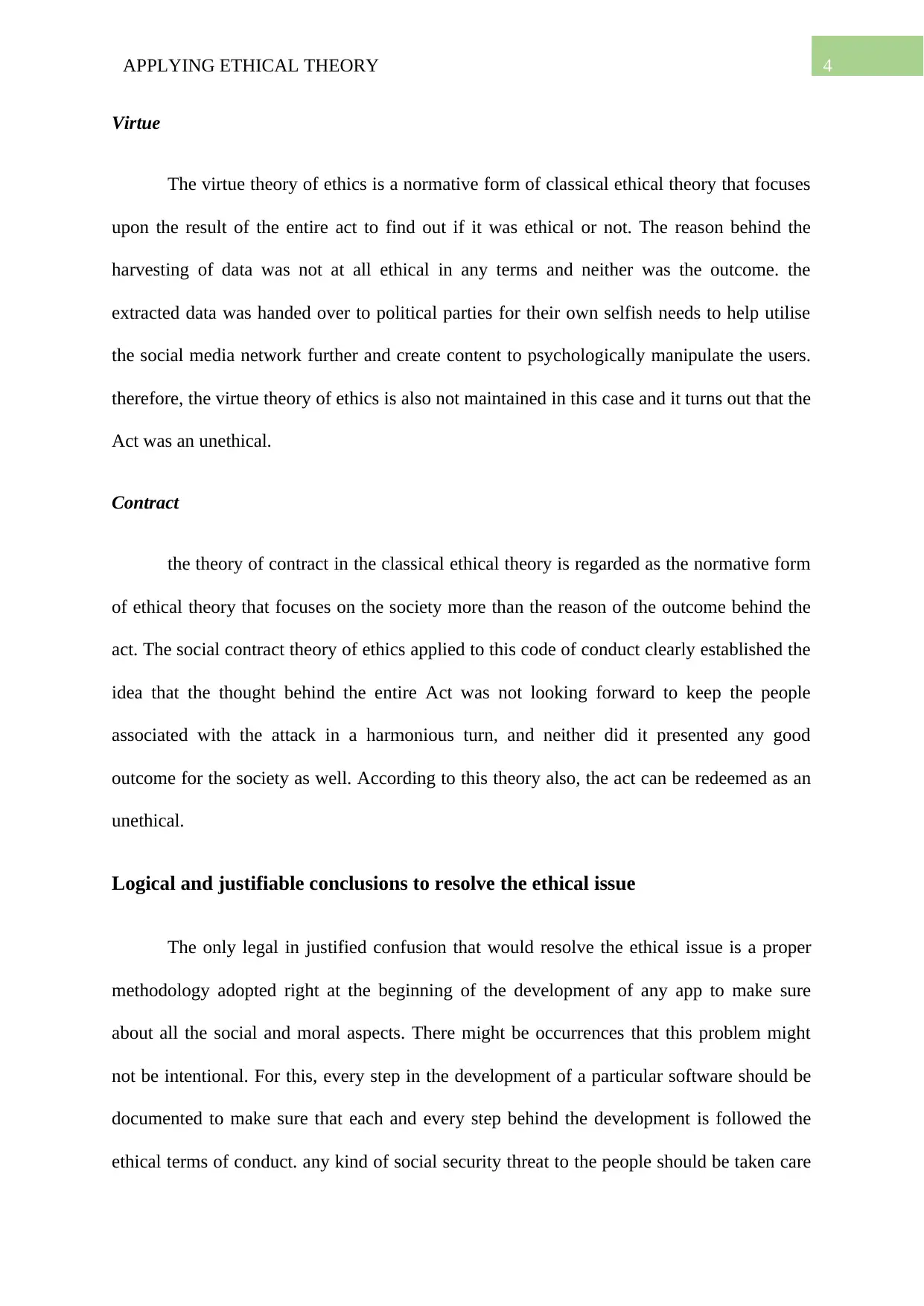
4APPLYING ETHICAL THEORY
Virtue
The virtue theory of ethics is a normative form of classical ethical theory that focuses
upon the result of the entire act to find out if it was ethical or not. The reason behind the
harvesting of data was not at all ethical in any terms and neither was the outcome. the
extracted data was handed over to political parties for their own selfish needs to help utilise
the social media network further and create content to psychologically manipulate the users.
therefore, the virtue theory of ethics is also not maintained in this case and it turns out that the
Act was an unethical.
Contract
the theory of contract in the classical ethical theory is regarded as the normative form
of ethical theory that focuses on the society more than the reason of the outcome behind the
act. The social contract theory of ethics applied to this code of conduct clearly established the
idea that the thought behind the entire Act was not looking forward to keep the people
associated with the attack in a harmonious turn, and neither did it presented any good
outcome for the society as well. According to this theory also, the act can be redeemed as an
unethical.
Logical and justifiable conclusions to resolve the ethical issue
The only legal in justified confusion that would resolve the ethical issue is a proper
methodology adopted right at the beginning of the development of any app to make sure
about all the social and moral aspects. There might be occurrences that this problem might
not be intentional. For this, every step in the development of a particular software should be
documented to make sure that each and every step behind the development is followed the
ethical terms of conduct. any kind of social security threat to the people should be taken care
Virtue
The virtue theory of ethics is a normative form of classical ethical theory that focuses
upon the result of the entire act to find out if it was ethical or not. The reason behind the
harvesting of data was not at all ethical in any terms and neither was the outcome. the
extracted data was handed over to political parties for their own selfish needs to help utilise
the social media network further and create content to psychologically manipulate the users.
therefore, the virtue theory of ethics is also not maintained in this case and it turns out that the
Act was an unethical.
Contract
the theory of contract in the classical ethical theory is regarded as the normative form
of ethical theory that focuses on the society more than the reason of the outcome behind the
act. The social contract theory of ethics applied to this code of conduct clearly established the
idea that the thought behind the entire Act was not looking forward to keep the people
associated with the attack in a harmonious turn, and neither did it presented any good
outcome for the society as well. According to this theory also, the act can be redeemed as an
unethical.
Logical and justifiable conclusions to resolve the ethical issue
The only legal in justified confusion that would resolve the ethical issue is a proper
methodology adopted right at the beginning of the development of any app to make sure
about all the social and moral aspects. There might be occurrences that this problem might
not be intentional. For this, every step in the development of a particular software should be
documented to make sure that each and every step behind the development is followed the
ethical terms of conduct. any kind of social security threat to the people should be taken care
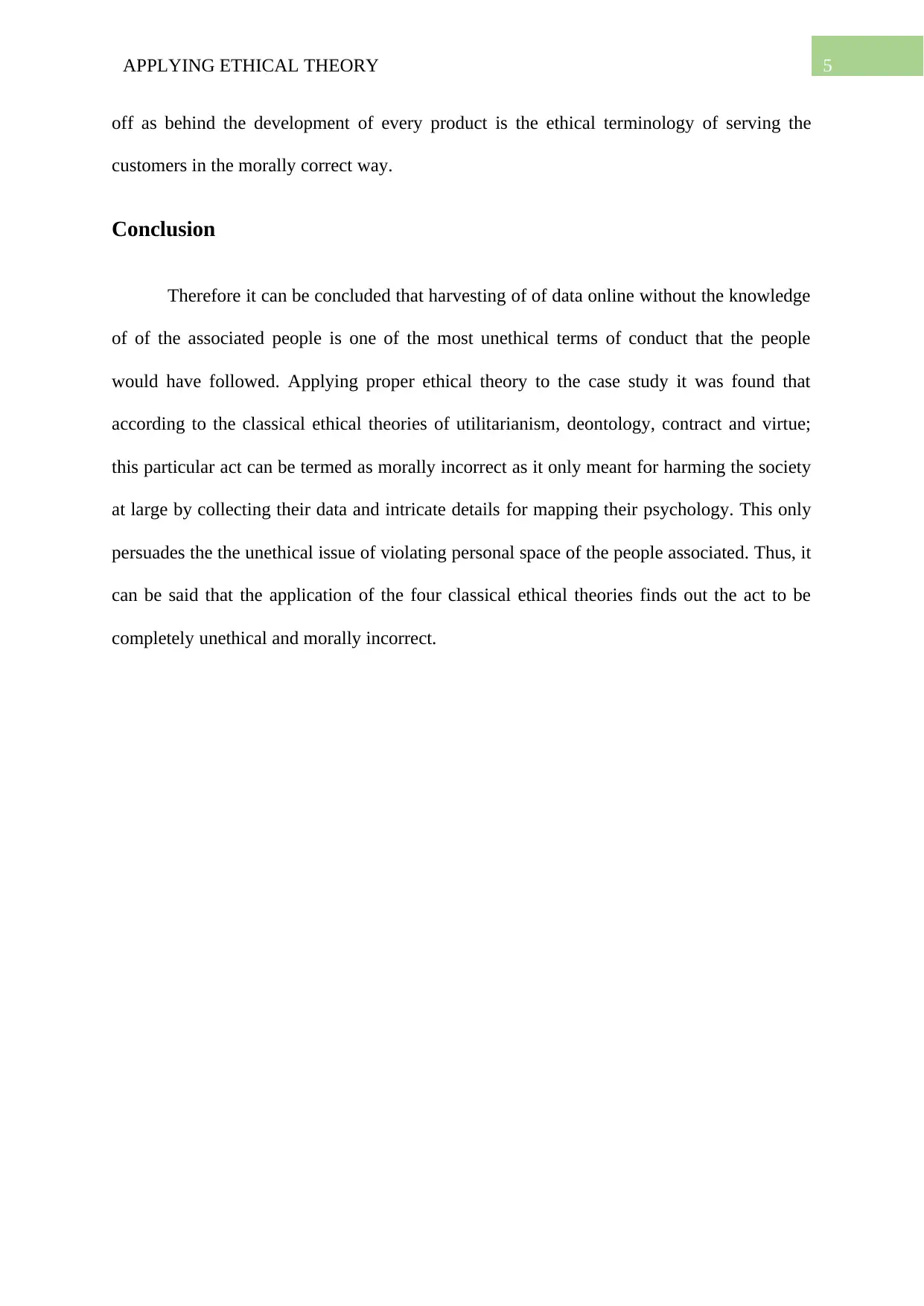
5APPLYING ETHICAL THEORY
off as behind the development of every product is the ethical terminology of serving the
customers in the morally correct way.
Conclusion
Therefore it can be concluded that harvesting of of data online without the knowledge
of of the associated people is one of the most unethical terms of conduct that the people
would have followed. Applying proper ethical theory to the case study it was found that
according to the classical ethical theories of utilitarianism, deontology, contract and virtue;
this particular act can be termed as morally incorrect as it only meant for harming the society
at large by collecting their data and intricate details for mapping their psychology. This only
persuades the the unethical issue of violating personal space of the people associated. Thus, it
can be said that the application of the four classical ethical theories finds out the act to be
completely unethical and morally incorrect.
off as behind the development of every product is the ethical terminology of serving the
customers in the morally correct way.
Conclusion
Therefore it can be concluded that harvesting of of data online without the knowledge
of of the associated people is one of the most unethical terms of conduct that the people
would have followed. Applying proper ethical theory to the case study it was found that
according to the classical ethical theories of utilitarianism, deontology, contract and virtue;
this particular act can be termed as morally incorrect as it only meant for harming the society
at large by collecting their data and intricate details for mapping their psychology. This only
persuades the the unethical issue of violating personal space of the people associated. Thus, it
can be said that the application of the four classical ethical theories finds out the act to be
completely unethical and morally incorrect.
⊘ This is a preview!⊘
Do you want full access?
Subscribe today to unlock all pages.

Trusted by 1+ million students worldwide
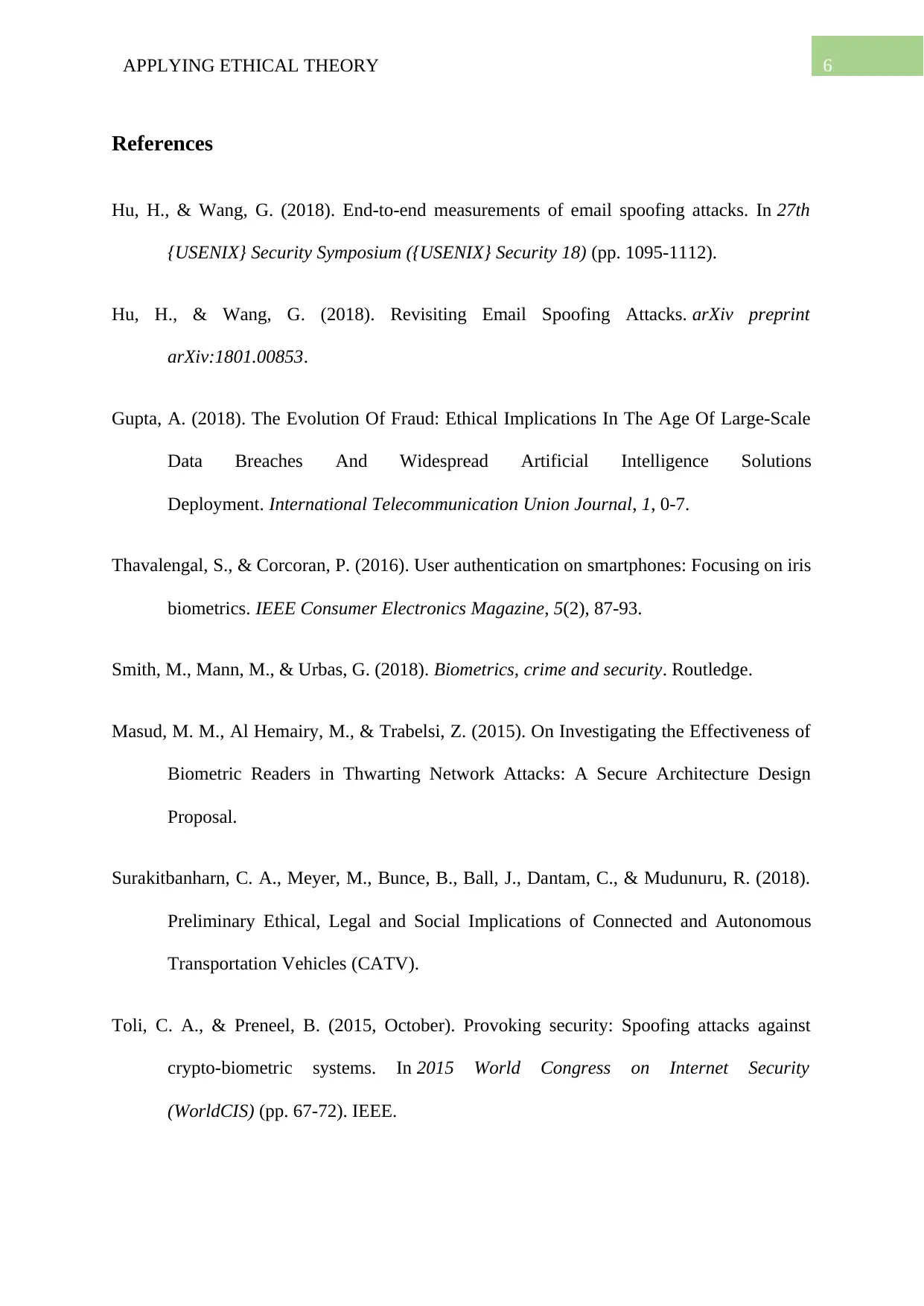
6APPLYING ETHICAL THEORY
References
Hu, H., & Wang, G. (2018). End-to-end measurements of email spoofing attacks. In 27th
{USENIX} Security Symposium ({USENIX} Security 18) (pp. 1095-1112).
Hu, H., & Wang, G. (2018). Revisiting Email Spoofing Attacks. arXiv preprint
arXiv:1801.00853.
Gupta, A. (2018). The Evolution Of Fraud: Ethical Implications In The Age Of Large-Scale
Data Breaches And Widespread Artificial Intelligence Solutions
Deployment. International Telecommunication Union Journal, 1, 0-7.
Thavalengal, S., & Corcoran, P. (2016). User authentication on smartphones: Focusing on iris
biometrics. IEEE Consumer Electronics Magazine, 5(2), 87-93.
Smith, M., Mann, M., & Urbas, G. (2018). Biometrics, crime and security. Routledge.
Masud, M. M., Al Hemairy, M., & Trabelsi, Z. (2015). On Investigating the Effectiveness of
Biometric Readers in Thwarting Network Attacks: A Secure Architecture Design
Proposal.
Surakitbanharn, C. A., Meyer, M., Bunce, B., Ball, J., Dantam, C., & Mudunuru, R. (2018).
Preliminary Ethical, Legal and Social Implications of Connected and Autonomous
Transportation Vehicles (CATV).
Toli, C. A., & Preneel, B. (2015, October). Provoking security: Spoofing attacks against
crypto-biometric systems. In 2015 World Congress on Internet Security
(WorldCIS) (pp. 67-72). IEEE.
References
Hu, H., & Wang, G. (2018). End-to-end measurements of email spoofing attacks. In 27th
{USENIX} Security Symposium ({USENIX} Security 18) (pp. 1095-1112).
Hu, H., & Wang, G. (2018). Revisiting Email Spoofing Attacks. arXiv preprint
arXiv:1801.00853.
Gupta, A. (2018). The Evolution Of Fraud: Ethical Implications In The Age Of Large-Scale
Data Breaches And Widespread Artificial Intelligence Solutions
Deployment. International Telecommunication Union Journal, 1, 0-7.
Thavalengal, S., & Corcoran, P. (2016). User authentication on smartphones: Focusing on iris
biometrics. IEEE Consumer Electronics Magazine, 5(2), 87-93.
Smith, M., Mann, M., & Urbas, G. (2018). Biometrics, crime and security. Routledge.
Masud, M. M., Al Hemairy, M., & Trabelsi, Z. (2015). On Investigating the Effectiveness of
Biometric Readers in Thwarting Network Attacks: A Secure Architecture Design
Proposal.
Surakitbanharn, C. A., Meyer, M., Bunce, B., Ball, J., Dantam, C., & Mudunuru, R. (2018).
Preliminary Ethical, Legal and Social Implications of Connected and Autonomous
Transportation Vehicles (CATV).
Toli, C. A., & Preneel, B. (2015, October). Provoking security: Spoofing attacks against
crypto-biometric systems. In 2015 World Congress on Internet Security
(WorldCIS) (pp. 67-72). IEEE.
1 out of 7
Related Documents
Your All-in-One AI-Powered Toolkit for Academic Success.
+13062052269
info@desklib.com
Available 24*7 on WhatsApp / Email
![[object Object]](/_next/static/media/star-bottom.7253800d.svg)
Unlock your academic potential
Copyright © 2020–2026 A2Z Services. All Rights Reserved. Developed and managed by ZUCOL.





